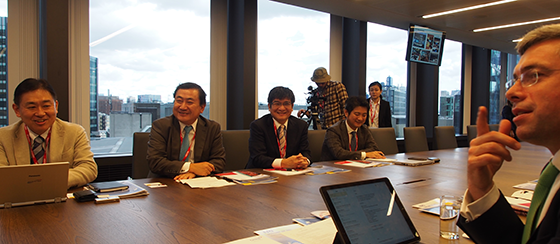
On July 31st, 2017 a CSR Dialogue was held with five distinguished experts based in London attending. A subsequent CSR Dialogue was held on September 12th, 2017, with three experts based in Tokyo attending. The experts, Mr. Kenji Yokoyama, Senior Corporate Managing Director and managers of NRI, discussed and exchanged opinions on topics about ESG that NRI Group needs to understand and what is an appropriate response for us to be more attractive to global ESG investors. Valuable opinions and insights acquired through the dialogue will be reflected in our business management and promotion of sustainability.
Participants
(Affiliation and position as of September 2017)

Colin Melvin
Founder and Managing Partner, Arkadiko Partners
Colin is a thought leader and agent for positive change, who has been at the forefront of global developments in corporate leadership, stewardship and sustainability and responsible asset management for over twenty years. He has international experience from the investor and corporate perspectives in developing and challenging strategy, promoting effective risk management and corporate governance and creating well-aligned incentives. He is Founder and Managing Partner of Arkadiko Partners. He is also Chair of Future-Fit Foundation, a member of the Corporate Advisory Group of The Future of the Corporation, the Advisory Board of Tobacco Free Portfolios and the Advisory Board of InfluenceMap.

Sachi Suzuki
Engagement Manager, Hermes EOS
Sachi Suzuki is sector lead for industrials and responsible for engagement activities mainly in Japan and southeast Asia. Prior to joining Hermes EOS, she worked as a senior research analyst at EIRIS, where she was responsible for the assessment of the ESG performance of Japanese companies, as well as research on bribery and corruption. Sachi graduated from Keio University in Japan with a degree in Economics and holds an MSc in Development Studies from the School of Oriental and African Studies, University of London. She holds the CFA UK - Investment Management Certificate.
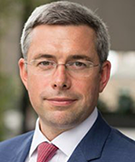
Dr. Steve Waygood
Chief Responsible Investment Officer, AVIVA INVESTORS
Steve co-founded and now Chairs the Corporate Human Rights Benchmark. He also co-founded the Sustainable Stock Exchange initiative as well as the Corporate Sustainability Reporting Coalition. He is also an Ambassador for the International Integrated Reporting Council. Steve was a member of the UK Government delegation to the UN Rio+20 meeting in 2012, and a member of the European Commission's expert groups on corporate governance and corporate responsibility. Steve was on the board of the UK Sustainable Investment & Finance association (UKSIF) from 2003 to 2010, serving as its Chairman from 2006. He was also part of the expert group that wrote the United Nations Principles for Responsible Investment.

Peter Webster
CEO EIRIS Foundation
Peter Webster has led EIRIS (now after merger part of Vigeo Eiris) since it was founded in 1983. He has focussed on the challenges of providing ESG ratings and research to a wide range of owners and managers, helping investors to make good use of that research and advancing the concept of responsible investment. Peter is a regular speaker on topics ranging from fiduciary duty to individual ESG areas and their global evolution as well as how responsible investment can contribute to a more sustainable and robust financial system. He was treasurer of the UK Sustainable Investment and Finance Association for 20 years until the end of 2011 and in October 2013 was elected by PRI asset manager and service provider signatories to be a member of the PRI Advisory Council. Peter is now Director of International Affairs at Vigeo Eiris.

Mauricio Lazala
Deputy Director, Business & Human Rights Resource Centre
Mauricio joined the Resource Centre in 2006. As part of the senior management team, he is involved in all major strategic, operational and financial decisions. He also manages the "Business, Civic Freedoms and Human Rights Defenders" project. Since 2014, Mauricio has been a member of the Board of the EIRIS Foundation. Previously, he worked at International Criminal Court, Mexican Commission for the Protection & Defence of Human Rights, and B'Tselem (Israeli Information Centre for Human Rights in the Occupied Territories). Mauricio has a Law degree (honours) from University of Cambridge, and a BA in Political Sciences and History from Hebrew University of Jerusalem.
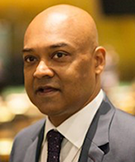
Dr. Puvan J Selvanathan
CEO, Bluenumber Foundation
Puvan is CEO of the Bluenumber Foundation, an international non-profit organisation providing a global platform for self-identification and recognition. He was formerly a United Nations Special Mandate Holder on Business and Human Rights appointed by the UN Human Rights Council, Head of Food & Agriculture at the UN Global Compact Office, and then Head of the International Trade Centre, a joint agency of the UN and WTO. Before joining the UN, He was Group Chief Sustainability Officer at Sime Darby, a Malaysian diversified conglomerate. An Architect by profession, He holds an MBA and a DBA in Corporate Strategy and Sustainability. He has designed townships, innovated ICT for Development PPPs in Local Governments, and wrote "Mozambique's E-Government Strategy".

Haley St. Dennis
Communications Manager, Institute for Human Rights and Business
Haley is the Communications Manager of the Institute for Human Rights and Business (IHRB), responsible for strategic and day-to-day management of IHRB's communications and engagement across all mediums. She is also the joint Programme Lead for the Mega-Sporting Events Platform for Human Rights (the MSE Platform) and IHRB's lead within the Corporate Human Rights Benchmark (CHRB), She has extensive experience in the application of international human rights and responsible business standards within a wide range of industry sectors, including extractives, employment and recruitment agencies, ICT, apparel and agriculture.

Tomoko Hoshino
Vice president, Environmental Partnership Conference (EPC)
Tomoko Hoshino is a vice president of EPC, which manages the Global Environment Partnership Plaza (GEOC). She has been serving as an NGO coordinator for several international conferences such as Rio + 20, the 10th Conference of the Parties to the Convention on Biological Diversity (COP 10), the G-7 Summit, the Environment Ministers Meeting, and the United Nations Education for Sustainable Development (ESD), and has been promoting NGO networking, partnership building among multi-stakeholders. She is also working on NGO activities toward Tokyo 2020. Involved with several NGOs, currently a board member of Africa Japan Forum, Japan NPO Center, Japan Civil Society Network on SDGs.
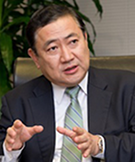
Kenji Yokoyama
Senior Corporate Managing Director, NRI
Leading initiatives for promoting sustainability and solution for social issues through NRI business, based on middle- and long-term perspective. He is in charge of sustainability, global operation planning, corporate communication, administration, operations & control, procurement, accounting and finance.
Other participants from NRI
Naoko Noro, General Manager, Corporate Communications Department
Yoshiro Shikino, General Manager, Administration Department
Kenji Honda, Manager of Sustainability & Responsibility Group
Shigeru Fujisawa, Manager, Sustainability & Responsibility Group
Facilitators
Hiroshi Ishida, Executive Director, Caux Round Table Japan
Saul J. Takahashi, Representative, Business & Human Rights Resource Centre Japan
Dialogue in London
Yokoyama (NRI):
NRI has had several dialogues in Japan, but it is the first time for us to have a dialogue abroad. The globalization of our company is increasing - for example, we are now completing the acquisition of an Australian company. Right now the ratio of our overseas sales is about 7 percent, but this is expected to rise. We understand that the more we globalize our business, the more we need to respond global investors, and would like to ask what aspects of ESG and human rights we should be aware of in this regard.
How do you see the recent changes in investor behaviour with regard to ESG investment?
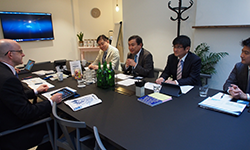
Colin Melvin:
We need to think what 'Shared value' means, as long-term value creation is different from short-term value creation. The values we are starting to share nowadays, are shifting to ones based on longer-term perspectives. In 1970s, we thought all we needed to do was to maximise individual wealth, but this resulted in externalised costs and a collapse in the benefits to society as a whole, as well as connectivity and harmony within communities.
Now a younger generation defines business in broader terms and regards transaction-centred businesses as wrong. There is more interest in knowing how we can engage in and contribute to society through business. The younger generation is more interested in relationships, than transactions. This is affecting investment behaviours. As the Baby boomers retire in the US, their money will leave the system and will be replaced by the savings of millennials. This will accelerate a shift in investment behaviours, producing new valuation models and increasing interest in ownership of companies rather than trading of securities. Investors will therefore be much more interested in the purpose of a company and its impact and influence on society, environment and economy rather than simply how much profit it makes.
This shift in focus from transactions to relationships will affect the form of leadership required for our institutions and a new form will emerge. This synchronous leadership (implying a synchronicity between leader and organisation and system) will enable leaders to change the world for the better by changing themselves rather than by imposing changes on others.
What kind of relationship should NRI develop with investors?
Colin Melvin:
Fiduciary duty is interpreted in different markets and by different type of investor. Some avoid investment in certain sectors, but others do not. The length of the period to maximise profitability also differs with different interpretations. Regarding reporting periods, we should encourage companies and investors to move away from the quarterly reporting cycle. Unilever has demonstrated that stopping giving quarterly guidance has attracted different shareholders to their shareholder register, who take a longer-term view and are more interested in their sustainability agenda. The CEO, Paul Polman, seems to have successfully deterred hedge funds from investing in his companies' stock, suggesting that with the right behaviours a company can encourage he right sort of shareholders to invest.
Honda (NRI):
Do you think the pursuit of ROE is also detrimental to long term investment?
Colin Melvin:
A simple analysis of the present value of future cash flows or ROE fails fully to measure the relationship between companies and their multiple stakeholders, including investors, employees and consumers. In order properly to understand a company's ability to create wealth and generate value in the longer-term, we need a richer analysis of these stakeholder relationships. This will lead us to a true measure of success and a description of our shared interest as investors and companies. I would suggest that NRI develop a 'shared value forum' where companies and multi-stakeholders jointly discuss what relationships they should build for their future success. The results of the discussion at the forum could be shared to make an impact on the wider society.
Colin Melvin:
The true opportunity for the PRI and other initiatives, is to change how business and investment operate to the benefit of society, environment and economy. So, we need to avoid institutionalising responsibility as something separate. Regarding ESG indices, these should support the shift to responsible business, however, we should avoid simple comparisons which fail to describe fully the richness of companies' contribution. It is important for investors to understand whether the indices they use are fit for purpose. Milton Freedman's famous statement that the purpose of companies is to make profits for shareholders is wrong. Companies are the engines of wealth creation in our societies and economies. Their profitability is a consequence of doing something good and something useful in the right way.
What points should we cover when we explain our corporate governance to international investors?
Yokoyama (NRI):
Last year, in 2016, NRI issued its first Green Bond, on the basis of an independent (second party) opinion certified by Vigeo Eiris. In the process, we experienced difficulties in filling the gap between what the international community expects, as incorporated in the Vigeo Eiris ESG assessment methodology, and what we think the expectations are of Japanese society. This gap can also be found in the area of corporate governance. There are some difficulties in meeting international expectations within the unique framework or Japanese corporate governance. At the end of the day, we believe that substance is more important than abiding by a fixed format.
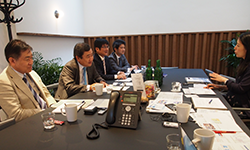
Sachi Suzuki:
We understand that each country has developed its own corporate governance system, and there is no 'one size fits all' model. It is important for NRI to capture the substance of what the global society expects, develop internal mechanisms to address that, and disclose information to respond to those expectations, even within the Japanese corporate governance framework. For example, we do not necessarily think the statutory auditor system per se is bad, but we ask for greater board effectiveness. While independence is very important, we also examine the monitoring function of the board, based on information received through engagement. In many cases, we start our engagement with IR executives and we may seek a meeting with independent directors as necessary. In the UK, it is not unusual for a company chair to engage directly with investors.
Honda (NRI):
We understand international investors have been paying increasing attention to how companies secure the independence of directors, such as by saying half of a board's membership should consist of outside directors. On the other hand, we would take into account whether outside directors understand Japanese traditions and culture, as well as CSV (creating shared value) in general. Do you think we can find 'a trade-off' between ensuring effectiveness of corporate governance and securing the independence of directors?
Sachi Suzuki:
Even in house directors may have an outsider's perspective, if they have experience of working for another company. For example, in the UK, people tend to switch companies whilst specialising in certain areas of expertise, such as human resources or finance. Having such experts as in house directors will help bring balanced views without reducing the level of understanding of the company's business. Establishing board committees does not always guarantee effective corporate governance. While we have seen an increasing number of advisory committees in the recent years, it is important to ensure they maintain an adequate level of independence and authority, and that their opinions are adopted by the board in a meaningful manner.
The nomination process for outside directors remains opaque at many companies. One way to ensure the independence of outside directors is to appoint them through a third-party specialised in director search. We also take into account the tenure of each director. We would question the genuine independence of outside directors who have been on the board for over ten years. Diversity in gender, nationality and race is also a theme widely discussed globally. A question may be raised at a Japanese company with all Japanese directors, despite having a large proportion of revenues coming from overseas sales, for example.
Shikino (NRI):
Whilst we find some Asian companies, including Korean companies, have a higher percentage of outside directors, upon closer examination, we often see that many of the outside directors have personal relationships with in house directors. The appearance of having a higher percentage of outside directors may not always capture the essence of what global society expects.
What information do investors expect us to disclose?
Sachi Suzuki:
Integrated reporting should not be understood as combining the sustainability report and annual report. It should articulate how environmental and social matters may affect your business, why those are integral elements of your business, and how you are addressing environmental and social issues.
We would like to see the results of board evaluations, including any negative feedback. Some companies disclose a list of skill sets needed for the board, together with details of expertise the current board members offer, thereby identifying the gaps. Involvement of a third party would also provide assurance on the evaluation. In addition, we strongly suggest you respond to investor requests for meeting outside directors.
Fujisawa (NRI):
'Create a level playing field' and 'Change the rule of the game'. - these are part of the mission of our management consulting operations. Do you think international investors will accept these activities as meaningful ones?
Sachi Suzuki:
Participation in public policy engagement or proposals on how industries should respond to changes in social structures when a new legislation or taxation (an example could be carbon tax) is introduced could be regarded as a meaningful activity by international investors.
Yokoyama (NRI):
The Japanese Government Pension Investment Fund (GPIF) has selected three ESG indices for Japanese equities, and has started passive investment tracking of those indices. Though it is still a gradual process, ESG investment is starting to be accepted in the country. We recognise human rights as an essential component of ESG investment. We have conducted several annual dialogue sessions with stakeholders in Japan, but based on the recognition that human rights will be a part of the ongoing globalisation of our company, we decided to have our first dialogue abroad.
What human rights issues we should be concerned about and address?
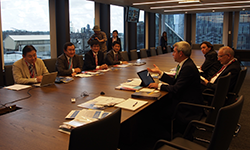
Dr. Steve Waygood:
CHRB (Corporate Human Rights Benchmark) plans to expand its target sector to include ICT, and we believe that digital rights will be an important theme in this sector. Digital rights includes freedom of expression. We have been seeing governments forcibly shutting down the internet, and placing restrictions on freedom of expression - this is a growing problem. Ranking Digital Rights, an initiative led by global NGOs, ranks companies' efforts on protecting freedom of expression and privacy rights. I would recommend that you consider how your business could potentially have a negative effect on these rights, and how you could provide a remedy to affected people.
Mauricio Lazala:
We understand that the ICT sector covers a very wide range of businesses, products and services. Looking at your four business areas, privacy rights might be more relevant to you, rather than the freedom of expression.
Dr. Steve Waygood
If you are automatically gathering personal information through NRI's business related to the Japanese government's 'My Number' personal identification system, it is very important to consider what human rights could be infringed by those operations, with reference to the Universal Declaration of Human Rights.
Yokoyama (NRI):
Since we are not a manufacturer, NRI does not have factories or factory workers in our supply chain. What we have are programmers/developers. However, we understand that respect for human rights is still important.
Honda (NRI):
We have 5,000 to 6,000 workers in China in our offshore development business.
Peter Webster:
To respect the human rights of workers in both your own company and in the supply chain, it is very important to 'know your vendors', and exercise your influence over the vendors to ensure all workers are appropriately treated, and respected in their work environment., I would add that the ILO Declaration on Fundamental Principles and Rights at Work and other internationally recognised human rights are all applied to workers both within your own business operations and your supply chain (in any industry, including ICT).
Mauricio Lazala:
Human rights issues should also be taken into account in the upstream of the supply chain. For example, I would recommend that NRI ensures conflict minerals are not used for your servers, and that energy for your machines and data centres is appropriately sourced, without human rights abuses.
How can NRI contribute in encouraging people to respect human rights, by integrating human rights perspectives into our business (service and products)?
Dr. Steve Waygood:
There is a positive influence NRI could exert. Through your consulting business, you could convey the importance of respecting human rights in business. I would suggest you participate in conferences at the UN, OECD, Davos, the World Investment Forum and others. Those will provide a good opportunity for you to develop a network, and build your brand in sustainability.
Peter Webster:
I am interested in your shared online service, and what sort of IT support you could apply to the area of sustainability and respecting human rights. For example, if your IT service could provide information on companies' policies, activities, and performance in respecting human rights, that may help individual portfolio managers in selecting companies on the basis of human rights perspectives.
Dialogue in Tokyo
What kind of actions are required from NRI which is expanding into the global market from the viewpoint of ESG in the future?
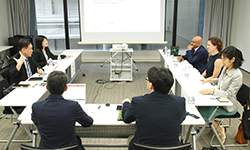
Noro (NRI):
We recognize that addressing the issues of environmental,
social and
governance (ESG) is essential today for any global company if it were to conduct its business
sustainably.
One of NRI's strategies set out in our long-term management vision "Vision2022" is promoting
globalization. From
the
perspective of ESG, what should we focus on as we promote globalization?
Dr. Puvan Selvanathan:
The issues of ESG, including human rights and the
environment, are
closely
linked with NRI's global strategies so that the two should not be considered separately.
ESG is now a global, universal concept. We are in an era where ESG standards are used as a basis for
quantitatively
evaluating client firms that NRI provides its services to and firms that NRI acquires through
M&A.
In these global trends towards ESG, it is important to have a perspective of how NRI will develop
its business
in
the future.
In other words, as NRI promotes globalization, integrating NRI's products and services into ESG and
developing
ESG
solutions and approaches could represent a significant business opportunity for NRI.
Honda (NRI):
Would that include globally marketing NRI's Shared Online Services for CO2 emissions reduction?
Dr. Puvan Selvanathan:
In addition to such a short-term perspective, the industry
sectors
that
NRI serves may substantially change over the next 10 to 20 years, at which point all firms will need
to have ESG
solutions.
It is important that NRI adopts a high standard of ESG within its own company. In addition, I hope
that NRI will
go
beyond that to develop ESG solution business for its future clients.
Noro (NRI):
NRI has a goal of more than tripling its sales from global businesses to 1 billion dollars by 2022, but we think this will be difficult if we were to continue with the status quo. In this context, I see the importance of assessing our future clients and developing ESG solutions.
What is NRI's responsibility as an ICT company?
Honda (NRI):
NRI is involved in the development of the "My Number System", which is a personal identification system that the Japanese government introduced in 2016. In a dialogue with ESG investors in London the other day, one of the investors pointed out that "It is very important to consider what human rights could be infringed by those operations." How should we consider the issue of "privacy and human rights" as it relates to system development?
Dr. Puvan Selvanathan:
In some countries where NRI is operating, including
emerging economies
like China, the Philippines, Thailand, and Indonesia, there are concerns about "privacy and human
rights"
issues.
In the U.S., most of the data tied to individuals are being held by major U.S. companies, and
protection of
individuals' privacy rights is an issue.
Generally speaking, when it is the government that is introducing a personal identification system,
the basic
assumption will be that the government has the authority to collect personal information, and in a
situation
like
this, a conflict is more likely to occur over individuals' privacy rights.
In a recent example, Indian citizens filed an objection against the Indian government's Aadhaar
biometric
authentication system covering all Indian nationals, on the grounds of violation of privacy rights,
and the
Supreme
Court ruled that the system should protect citizens' rights to privacy.
On the other hand, in Estonia, citizens own their personal information and can access, check, and
correct their
own
data, in reaction to human rights violations during the Soviet era. The assumption here is that
citizens are
right.
This may serve as a good example.
Honda (NRI):
Were you referring to the case in India as a bad example?
Dr. Puvan Selvanathan:
I wouldn't say a bad example. It is that the issues
surrounding
"privacy
and human rights" are still new and people are exploring how they can address those issues.
The technology that NRI developed for the "My Number System" in Japan could become a solution in ICT
markets in
other countries with "privacy and human rights" issues, because the technology has been developed by
taking into
consideration people's rights to privacy.
Haley St. Dennis:
It should be noted that if the Japanese government tried to wrongly use personal information, it would be NRI's responsibility to exercise some kind of influence along the lines of the concept of protection of privacy rights and try to correct it.
What should be noted about human rights issues when responding to temporary staff?
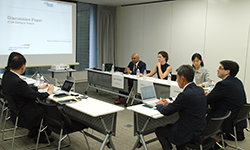
Noro (NRI):
We have many temporary staff working at NRI. Is there anything we need to consider in terms of their human rights?
Haley St. Dennis:
Generally, temporary staff are in a vulnerable position
because
recruitment agencies act as intermediaries and temporary staff cannot negotiate directly with the
company that
they
will actually be working for on matters such as their working conditions.
For example, employment of temporary staff is increasing in the U.K., and some are employed under a
"zero-hours
contract," which provides no guarantee on employee's working hours or their rights to organize and
bargain and
which
can be used by the employer to fire the employee at will.
Even though such temporary staff may have equal education and skills as those with permanent
employment, they
receive substantially lower wages only for the reason that they are working as temporary staff. It
is important
that
temporary staff are guaranteed the same rights as those with permanent employment.
Honda (NRI):
Would that mean that the underlying principle should be "equal pay for work of equal value"?
Haley St. Dennis:
Of course, "equal pay for work of equal value" is
fundamental.
However, in
real life, that principle may be undermined by the recruitment agencies. It is quite often the case
that the
terms
promised by the recruitment agency were different from what are actually delivered by the company
that the
temporary
staff actually work for.
What NRI should do when employing temporary staff is that you should have sufficient discussion with
the
recruitment
agency and make sure that they clearly understand that NRI expects the recruitment agency to fully
respect the
rights of these workers. NRI can also create opportunities to talk directly with these workers.
Honda (NRI):
We have a hotline for regular employees at NRI. Should we expand it to temporary staff?
Haley St. Dennis:
I will recommend that you do. The complaints are a very
important
source
of information for you to know what problems they have, and you will be able to take action before
the problem
gets
worse.
If there are only few complaints, it may be an indication that they do not know that a hotline
exists, or they
are
not using it for fear of reprisal. Therefore, it is necessary to communicate to the employees that
they have the
right to use the hotline and it is safe to do so.
What should we do first about environmental activities for overseas bases?
Noro (NRI):
In terms of the environment, NRI is working actively on expanding information disclosure and setting environmental targets. In Japan, we have environment management systems and are promoting energy conservation in data centers. On the other hand, we feel, as we become more global, that we should promote our efforts in addressing the environmental issues on a global basis. As NRI acquires overseas firms through M&A, what should we be doing at our overseas firms?
Tomoko Hoshino:
EU has stringent environmental regulations on the use of
chemical
substances, including the precautionary principle. Australia also has strict regulations on
protected species
and
biodiversity. These regulations should be taken into account when entering new markets and forging
new
partnerships.
Since NRI's business is not a manufacturing industry, I think will not use hazardous chemicals
directly, but
attention should be given to chemical materials used in office wall materials, as well as to whether
illegal
logging
timber is not used, for example.
Honda (NRI):
I see. We do have a system for waste disposal management in Japan, but we are not aware of the use of chemicals or the fairness of materials that go into the building walls of our overseas firms, many of which are small offices on lease. Should we be adopting the environment management system that we have in Japan at our overseas firms by incorporating the points that you just mentioned?
Tomoko Hoshino:
I think it will be good to actively transfer abroad the
environment
management systems and technology that Japanese firms excel in.
Many developing countries are still afflicted by serious problems of environmental pollution, and
Japan's
experience
in overcoming this problem can benefit those countries. I would like to see NRI navigate and lead
efforts to
create
a sustainable society with partner firms.
Stakeholder dialogue is important for both environment and human rights. Presence of a Japanese
company will
have
impact on the local community one way or another. It will be important to maintain sufficient
dialogue with the
local community and government and to create an atmosphere that encourages shared discussions on
matters of the
environment and human rights.
Since environmental and human rights issues are both involved with people's rights, I would advise
you not to
think
of them separately. I would like to see NRI promote local stakeholder dialogue with a mindset that
"protecting
the
environment is also about protecting human rights of people to live in a beneficial living
environment."
Should NRI align their activities to SDGs sooner rather than later?
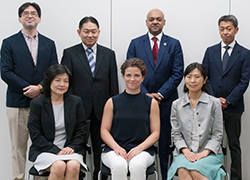
Noro (NRI):
An increasing number of companies are putting out statements saying that they will align their activities to the Sustainable Development Goals (SDGs) adopted by the United Nations in 2015. Would it be better for NRI to be engaged in this field sooner rather than later?
Dr. Puvan Selvanathan:
It will probably be better to be proactively engaged in
this field
rather
than jump on the bandwagon simply because every other advanced company is expressing support of the
SDGs.
Everybody is getting very serious about SDGs. I am currently working with the United Nations
Development
Programme
(UNDP) to develop a system for tracking SDG commitment in the private sector in Malaysia.
Because SDGs cover a wide range of fields, I would recommend that you start thinking from the
perspective of how
NRI
can contribute to the SDGs through activities that NRI is already engaged in. You could get lost if
you try to
do
something entirely new for the sake of implementing the SDGs.
Tomoko Hoshino:
In this age where ESG is becoming a benchmark against
which
institutional
investors assess firms and it is de rigueur for major corporations to promote ESG, I think NRI
should adopt the
stance of "As a major corporation, naturally we are working on SDGs."
And here again, stakeholder engagement is important. "Partnership" is one of the important goals of
SDGs (Goal
17)
and an important keyword when expanding the activities of SDGs. I am also involved with the
activities of Japan
Civil Society Network on SDGs. There are many ways in which companies can contribute to SDGs, and I
look forward
to
working with you.
Yokoyama (NRI):
We truly appreciate this great opportunity through which
we could
listen
to many valuable opinions and insights related to ESG, including human rights, from very famous
foreign
experts.
Surprisingly, Japanese TV covered our CSR dialog in London. I felt that ESG investment is now being
watched with
keen interest not only in Western countries but also in Japan.
I think that ESG investors will watch the enterprise ESG activities more strictly than before.
Valuable opinions and insights acquired through the dialogue will be reflected in our business
management and
promotion of sustainability. We are building a sustainable tomorrow today.
(Published in 30, Nov. 2017)